Description
Haitian Blue is what made Haiti famous for coffee. At one time it was as rare, as tasty and as expensive as Jamaican Blue Mountain but unfortunately those days are long gone. The Haitian economy was toppled a couple times for a plethora of reasons (including corruption and earthquakes). The fields and farms went untended and were abandoned, later the coffee trees were mostly used for firewood to folks living in the area. Very sad start to this coffee but this should be a positive story, for these beans represent the resurrection of awesome Haitian Coffee. Co-ops have stepped in, helping with nursery’s, strain selection and processing. Operations like Cafe Kreyol and Singing Rooster have stepped in to provide outside financing and marketing, it has finally gotten to the point of pretty awesome coffee again, but the most important factor is still growing; folks like yourself buying and loving the coffee.
The last 5-10 years has been the rebirth of Haitian coffee. They have resurrected the farms though social co-ops that work very hard to create a premium product to achieve very high dollar values. Which in turn greatly help rebuild the infrastructure while provide excellent jobs and opportunity. Solving the worlds problems one cup at a time.
Cafe Kreyol goes into some of the most impoverished and troubled areas that are within prime coffee growing territory, organizes farmers, teaches how to correctly process beans, guarantees purchase of the beans at way above market prices ensuring it goes directly to the farmers and strives to really turn around some of the more troubled areas, putting people to work at well above average wages and ensuring future livelihoods.
Joey, a good buddy of Burman Coffee and the head of Cafe Kreyol, brings his mission statement even to his US employees. He finds the hardest working individuals with great work ethics that for one reason or another have really been put down with employment and troubled times to help them recover and build a resume while also being able to help communities around the world. One can feel really good about supporting any of Cafe Kreyol’s projects and for the most part – really tasty coffees as well.
Cafe Kreyol projects including this one are project coffees, although tasty coffee, fresh and decent prep. A lot of the cost of these beans come from the social projects both the Co-ops and Cafe Kreyol sustain.
Tasting Notes: Awesome cup this season, good from light to dark. Darker roasts which are more traditional for Haitian coffee, come off robust and strong with a floral islandy sweet edge and a smoky aftertaste. Bigger bodied and on the chocolaty spicy side of things. Being a little cleaner, this cup is very good at light to medium roasts as well; sweet with a more nutty/caramel tone, can come off a little herbal too light so tread lightly. A little acidity but not enough to push folks away. A lovely daily drinking cup. Heavier bodied and lower acidity, semi-sweet hints of floral and caramel, balanced with a nice strong earthier chocolate note. Darker roasting makes for a pretty bold cup with some added smoky factors.
Roasting Notes:
Beautiful larger beans, medium to low chaff and fairly even roasting. We recommend a solid medium roast to start. Fuller bodied and smooth with a sweet edge. Looking for a more delicate cup with sweeter hints of nutty/caramel/floral? Go a little lighter. Looking for a very strong semi-sweet chocolaty cup with a smoky edge? Make sure to touch 2nd crack with it. Great prep and a easy to roast coffee. Medium to low chaff
This Haitian Blue Grade 2 has a clear sense of origin: it comes from the APCAB cooperative (Association des Planteurs de Café de Belle-Anse), a group of around 680 producers whose coffee is known for its creamy texture and softness. APCAB receives payments roughly 300% above the Fair Trade minimum for quality a scheme that rewards results rather than charity.
Historically, APCAB has stood out for quality (winner of Haiti’s first national coffee competition) and operates in the Sud-Est department the Belle-Anse / Thiotte areas where shade-grown coffee is notable and less common than in other parts of the country.
The Grade 2 lot is grown at 1,200 meters and washed, sourced from the same cooperative as Grade I but up to 400 meters lower. In the cup, reports naturally low acidity, high sweetness, a creamy, clean body, and nutty aromatics showing best at light–medium for pour-over or a gentle medium for French press. The raw material blends Arabica Blue Mountain, Catimor, and Typica a practical mix for balance and resilience and, as in many origins, it is sun-dried after washing. Roasting is forgiving; a low-and-slow approach helps maximize caramelization while preserving the cup’s smooth balance.
About the varieties: Blue Mountain belongs to the Typica group (known in Jamaica as “Jamaica Blue Mountain”), celebrated for a soft, balanced cup; Typica is one of arabica’s foundational lines, associated with very clean, refined cups; and Bourbon brings prominent sweetness, bright acidity, and a rounded body, with notes of caramel, fruit, and chocolate depending on origin and processing. This combination helps explain the creaminess, low-to-moderate acidity, and almond/cream tones often found in Haitian Blue.
The difference between Haitian Blue™ Grade I and Grade II comes down to altitude, genetics, and cup/roast behavior: Grade I comes from higher plots (≈1,600 m) and combines Blue Mountain + Bourbon + Typica; in the cup, it feels very sweet, with a thicker and cleaner body, with soft floral acidity and a nutty/chocolatey undertone. It’s more versatile in roasting (it works from light to dark), with a very comfortable point in the middle—slightly lighter to highlight brightness, or darker to accentuate cacao. Grade II, on the other hand, is grown lower (≈1,200 m) and substitutes Bourbon for Catimor (Blue Mountain + Catimor + Typica); this translates into naturally lower acidity, a creamier body, and a very pleasant nutty aroma—it’s the classic “gateway coffee.” Although it’s also flexible, it shines in light-medium roasts and appreciates a low-and-slow approach to caramelize without losing its smoothness.
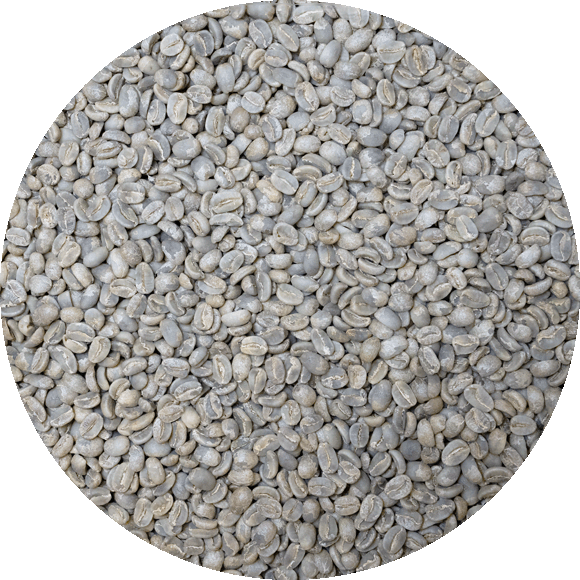
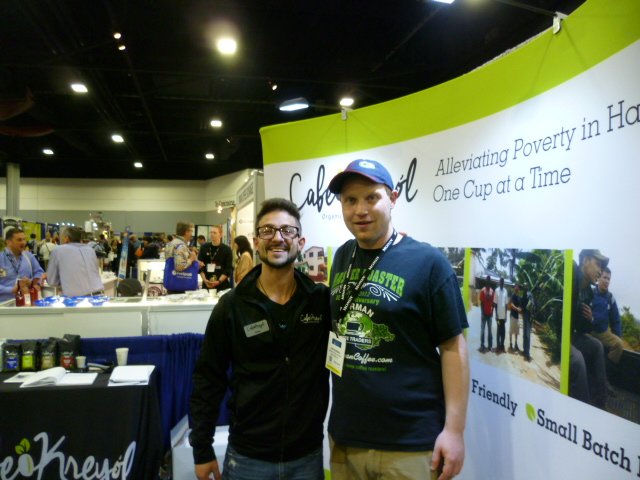
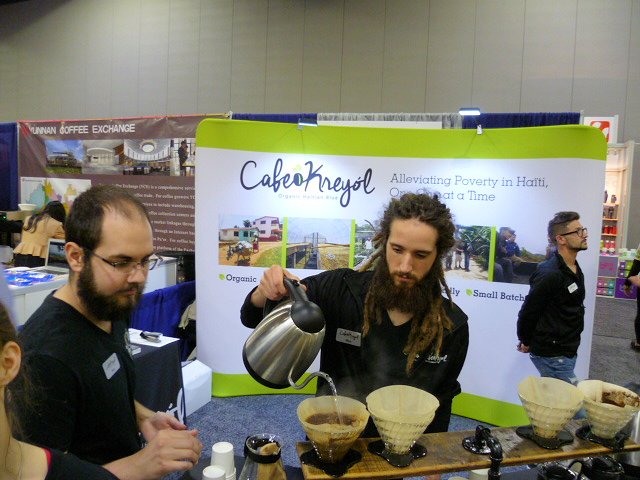
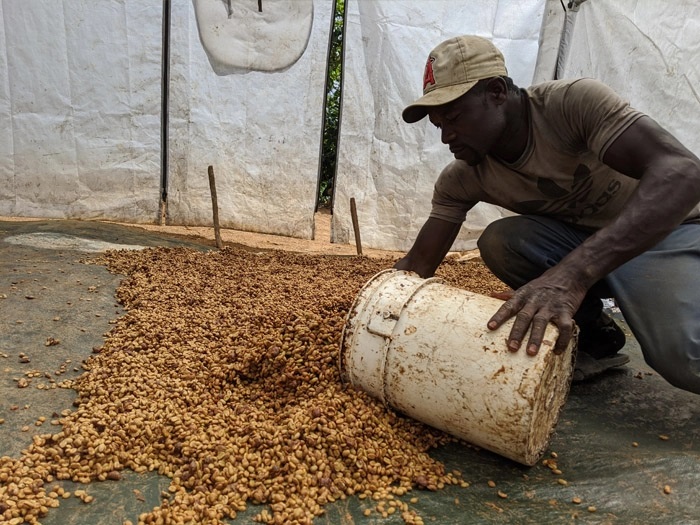
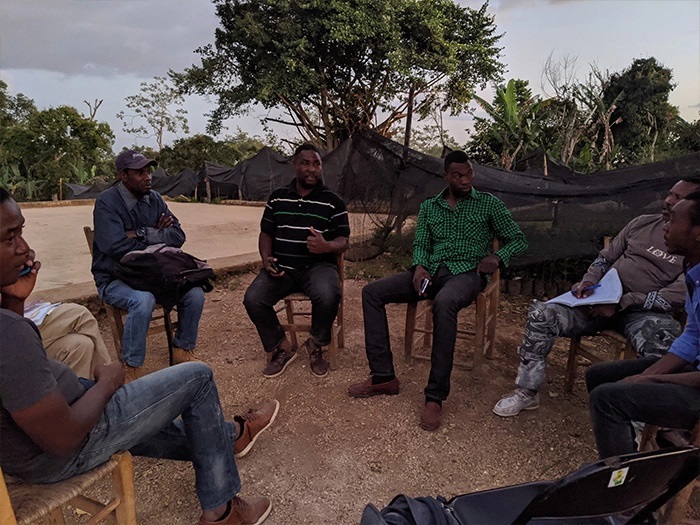
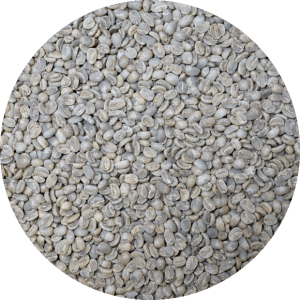
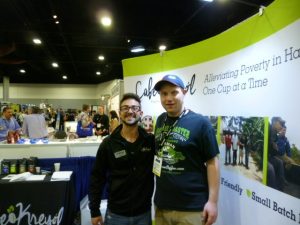
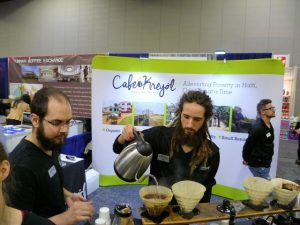
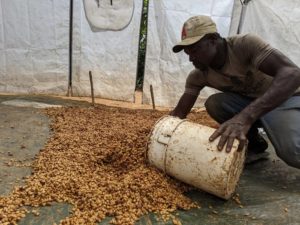

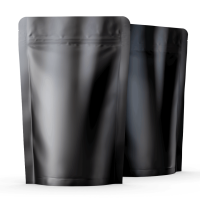

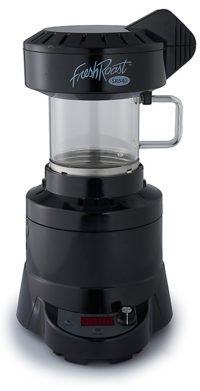
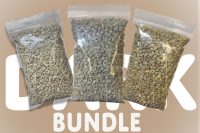

John G Turner (verified owner) –
Excellent coffee. Spot on desciption. Roasted to dark medium. I like very much!
Ed Ryan (verified owner) –
This is a great coffee – the description is accurate. I roasted to dark medium – let sit 5 days and am enjoying a cup as I write this. Going to grab some more while it’s available 🤙